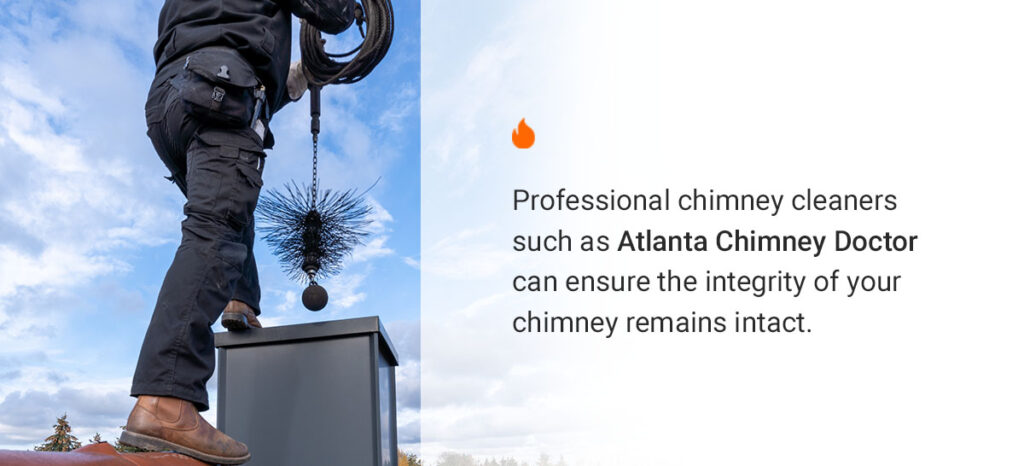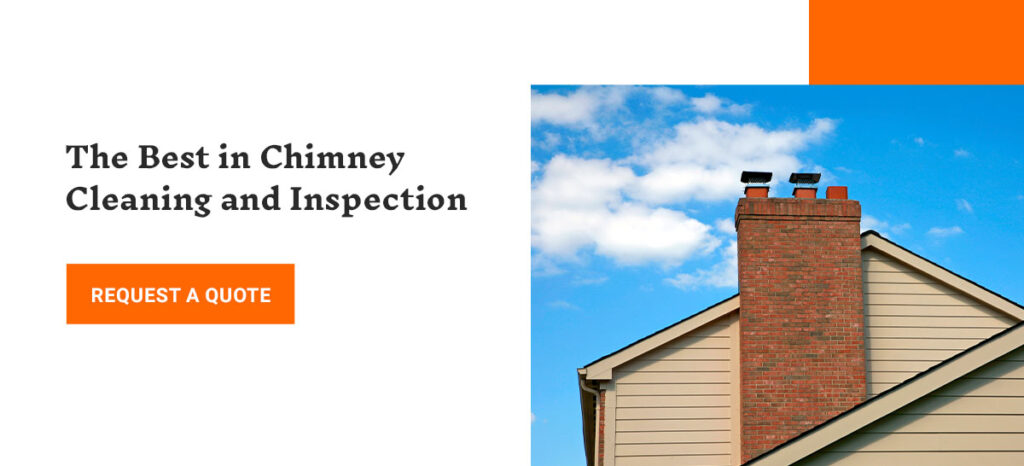Maintaining your chimney can protect it from damage and deterioration, improving its life span and efficacy. Learn more about how moisture can damage your chimney with this guide. Once you understand why your chimney is leaking, you can start taking steps to fix it and prevent it from happening again.
Causes and Effects of Chimney Moisture Damage
Your chimney is exposed to the harsh elements that eventually cause cracks in the bricks, making them even more vulnerable to water damage.
1. Causes of Chimney Moisture Damage
Moisture damage can come from several sources. Here are the main causes of chimney damage from moisture:
- Rainfall and condensation: As the exterior of your chimney takes the brunt of the winter season, water seeps into the cracks and mortar of the bricks. Once water is nestled there, it freezes, expanding the cracks. Eventually, the bricks will start to crumble apart.
- Damaged flashing: The material connected to the base of your chimney on the roof is called flashing. Flashing is waterproof and is vital for keeping water from seeping into your home. Old or damaged flashing can cause moisture and water damage in your chimney.
- Defective chimney caps: Not having a working cap above your chimney leaves it vulnerable to rainfall and snow falling in, causing damage to the brick and mortar.
2. Symptoms of Moisture Damage in Chimneys
The signs that your chimney has water damage will be present on the walls close to your chimney. Watch for these effects of water damage:
- Visible water stains and leaks on your wall: Your wallpaper may begin to peel off, and moisture may be visible on your ceiling near your chimney.
- Condensation inside your fireplace: Moisture inside the chimney may cause fog to appear when you start a fire.
- Damaged masonry: Look for cracks, chipping and deteriorating bricks or mortar.
- A damp smell from your chimney: Your chimney may have water damage if you notice a damp smell, particularly after heavy rain.
- Reduced efficiency: Inefficient chimneys allow smoke to flow back into your house.
3. The Impact of Moisture Damage on Your Chimney and Home
Your chimney can be heavily compromised when it’s moisture-damaged, which affects your home and safety.
- Fire risk: The bricks, mortar and chimney liner are supposed to protect your chimney from the intense heat and flames. If these parts are damaged, they can’t function properly, which increases fire risk.
- Structural integrity: Chimney damage can compromise the structural integrity of your home. Address chimney damage promptly to prevent the deterioration of your walls and ceiling from becoming an issue of its own.
- Possible toxic gas exposure: Chimney damage can have uncomfortable and dangerous consequences. Whenever fuel burns, it creates carbon monoxide, a colorless, odorless gas that can be deadly. Damage can prevent your chimney from directing this and other harmful gases out of your home.
How to Prevent Moisture Damage in Your Chimney
It’s not always possible to prevent damage entirely, but you can take steps to keep it under control.
1. Inspect and Clean Your Chimney Regularly
Regularly inspecting and cleaning your chimney can help prevent moisture buildup and catch issues early. Check your fireplace after storms and note if you have a musty smell in your home. You can also hire a professional to inspect your chimney and make recommendations based on its conditions.
2. Waterproof Your Chimney
Waterproofing your chimney is vital for your family’s safety and your home’s integrity. Ensuring proper waterproofing protects the structure around your chimney from rain and your family from toxic gas and undesirable smells.
You can explore various avenues for waterproofing your fireplace:
- Repair deteriorating masonry.
- Protect your chimney’s exterior with waterproof sealant.
- Replace your flashing or the sealant around the chimney.
3. Use Chimney Caps to Help Prevent Damage
Your chimney cap sits over the chimney like an umbrella, preventing rain and snow from coming into your home. A damaged or missing cap is often a cause of moisture deterioration. A working moisture cap on your chimney protects your fireplace from damage.
Repair or Replace a Moisture-Damaged Chimney: Weighing the Options
Whether you should replace or repair a damaged chimney relies on various factors. An expert can help in deciding which course of action is best. Consider the following aspects when repairing or replacing your chimney:
1. The Extent of Chimney Damage
The depth of chimney damage and deterioration will determine whether you should have it replaced or repaired. When damage is not too serious, repairs may be enough. A professional chimney inspection can help determine if the damage is too severe for a repair.
2. Chimney Age
If your chimney is old and fragile due to years of use, a replacement is often the best option. A newer chimney is more likely to have plenty of parts in good enough condition that a full replacement is unnecessary.
3. Cost
It’s best to get quotes for repairs and a replacement. Although a repair may be cheaper upfront, replacing your chimney may be more cost-effective in the long term than making repeated repairs.
4. When to Call in a Professional
When you notice any damage to your chimney, such as a smell, leaks or masonry deterioration, it’s time to call in a professional. Professional chimney cleaners such as Atlanta Chimney Doctor can ensure the integrity of your chimney remains intact. Getting the help of experts for your chimney inspection and cleaning means you give the best to your family and your home.

Frequently Asked Questions
Here are a few answers to common questions to help you troubleshoot minor chimney issues:
1. How Do I Get the Moisture out of My Chimney?
The only way to get existing moisture out of your chimney is to let it dry out naturally. You’ll want to find the source of the problem and make the appropriate repairs to prevent moisture from getting inside in the future. Water often gets in through faulty flashing or chimney caps. Repair or replace the flashing and check that your cap works to keep moisture at bay.
2. Is It Normal for a Chimney to Leak When It Rains?
It’s not normal for a chimney to leak when it rains. A leaking chimney is due to bad flashing, a missing or damaged chimney cap, damaged masonry and liner issues. If your chimney liner is not installed correctly, it can also cause your flue to leak.
3. Is Waterproofing a Chimney Worth It?
Waterproofing a chimney from moisture damage is worth it and protects your family from adverse effects and your property from deterioration. The best way to prevent moisture damage is to waterproof your chimney properly.
The Best in Chimney Cleaning and Inspection
Chimney damage and deterioration have many causes, the most prominent being deteriorating masonry, a damaged cap, poor chimney lining and bad flashing. These make your flue vulnerable to rainfall and condensation, exacerbating the issue.
To protect your home from structural damage, it’s important to choose a chimney specialist over roofers with the right expertise to diagnose and repair chimney-specific issues properly. At Atlanta Chimney Doctor, we care about you and your family and want you to enjoy your fireplace safely. Request a service from us and let the experts care for your chimney.

